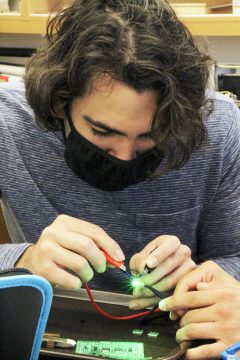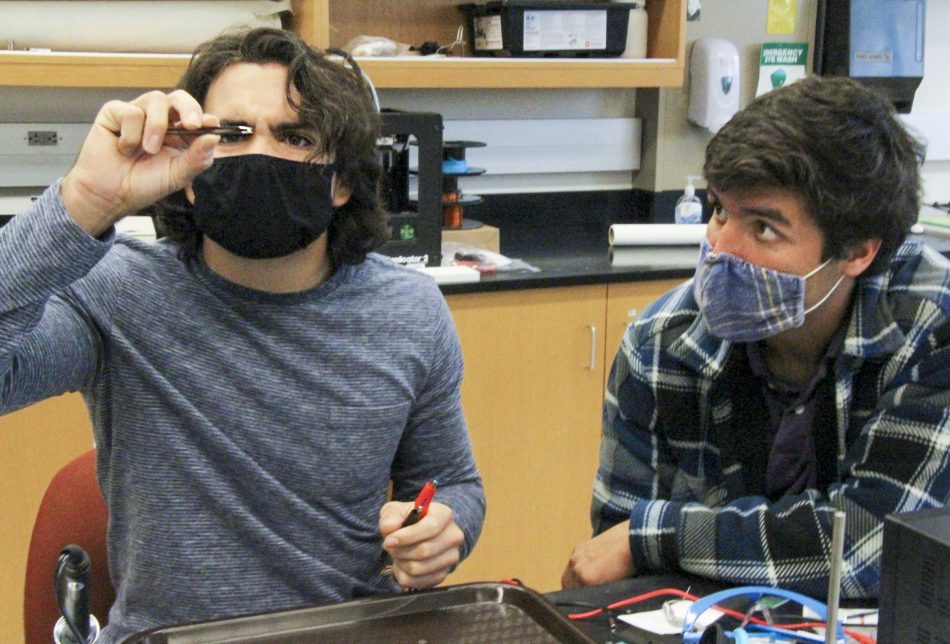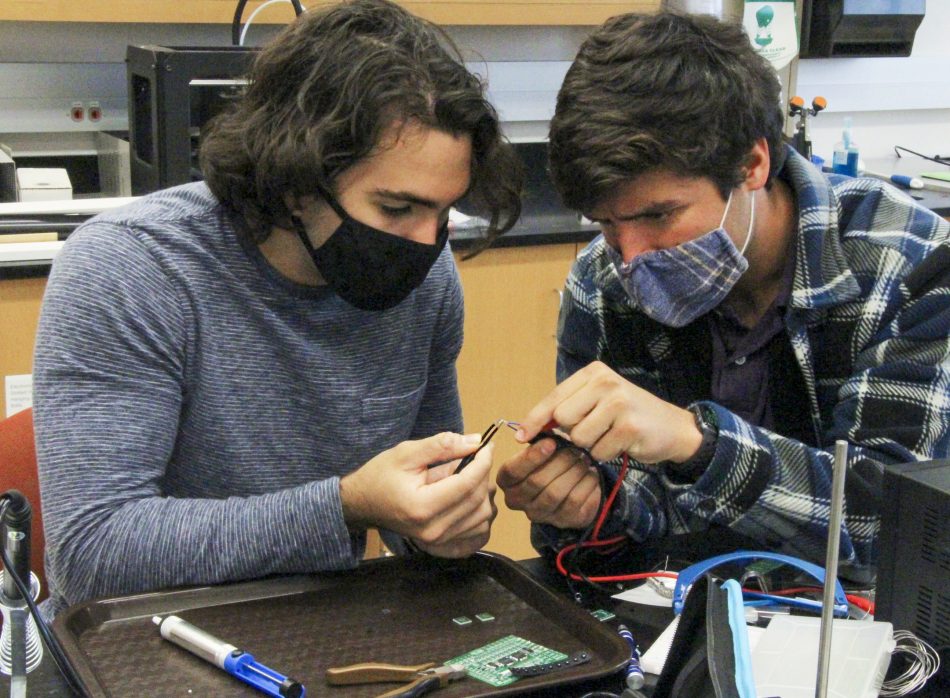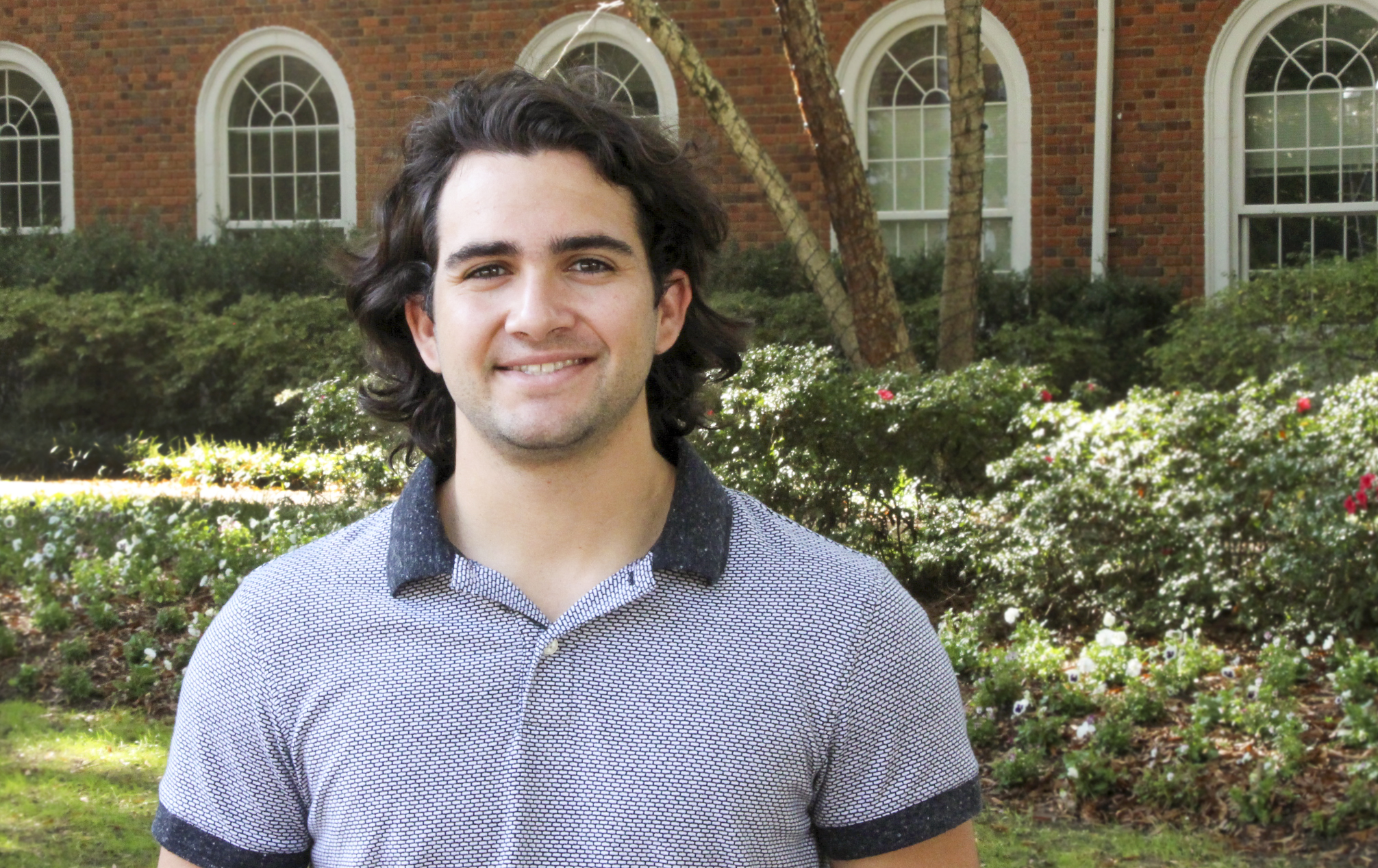Matthew Del Valle '21 spent the last two summers at Wastequip in Charlotte, N.C., where he contributed to the company's product designs and manufacturing process. The company has offered him a full-time position after graduation.
With a design entering the patent process and preparing for a post-graduate job, Matthew Del Valle ’21 knows that effective communication is as important to successful engineering as technical know-how.
Engineering based on collaboration and clear objectives lead to better designs and solutions, he’s found.
Del Valle’s persistence, adaptability and ability to communicate are what landed him two summer internships with Wastequip — a leading manufacturer of waste management equipment and one of the Charlotte metro’s top-rated employers — and set him up for a full-time position there. He recently signed an invention disclosure form with the company as it applies for a patent on a container he designed this summer.

“It was an awesome experience,” Del Valle said. “I was completely redesigning a new trash container so we could start shipping more of them. My boss pretty much said, ‘This is your project, what can you do? Figure it out and let me know if you need help or need to talk.’ I was given free rein to do anything I wanted.”
Del Valle — an engineering major with a biomedical concentration and computer science minor — continues working part-time for the company from Elon.
In his senior year, Del Valle sees how Elon’s four-year engineering program has refined the skills required to be a strong engineer and valuable employee.
“Talking to Elon professors about projects I was working on and knowing what I needed to ask prepared me,” Del Valle said. “It gave me the confidence to present my ideas, to explain why they’re good ideas, and the ability to answer questions confidently.”
His clear-eyed drive stood out early on, even among strong and skillful classmates.
“I’ve always been impressed with Matt and his approach to learning,” Associate Professor of Engineering Scott Wolter said. “He’s dedicated to being a part of classroom activities, and always eager to learn and understand the subject matter. His approach is methodical and logical. Now, he steps into leadership roles easily.”
Always a maker and doer — he spent free time teens designing and building projects at the family home outside Los Angeles — Del Valle ’21 came to Elon specifically for its growing engineering program.
“Because of my brother (Kyle Del Valle ‘17), I knew the kind of experience I would have at Elon. When I found out Elon had a four-year engineering program, that was it. I knew I was coming here,” Del Valle said. “It’s been even better than I expected. The professors are so willing to take time with you, making sure you really understand the material.”
Beyond the material, Elon’s engineering faculty and courses emphasize learning through design — with Grand Challenges design projects required during each of the four years, often in collaboration with classmates. Learning how to integrate multiple perspectives and invite feedback in the design process has made him a better engineer, he says, eager to create solutions with clients through a conversational approach.
He believes that skill especially helped him succeed at Wastequip.

In the spring of his sophomore year, Del Valle was determined to land an internship. He submitted cover letter after cover letter, and failed to hear back from more than 40 companies. Undeterred, he persisted and when he heard back from Wastequip, he leaped at the opportunity.
The company designs and produces garbage containers, compactors, balers and more to dispose of household, commercial, industrial waste and recyclables. It’s in the process of re-evaluating operations and product designs for efficiency and innovation, Del Valle said.
The product Del Valle designed this summer is a metal waste container that changes the way these containers have traditionally been manufactured. The design should be more efficient to manufacture and easier to ship.
Throughout each summer, Del Valle took advantage of opportunities to involve himself in Wastequip’s projects and interact with other engineers and supervisors. His first week as an engineering intern, the company sent him to a New Jersey plant with the goal of identifying inefficiencies in the manufacturing process and designing a solution. Del Valle spent the week evaluating the assembly line and speaking with employees. He’d redesign an area, show it to workers for feedback, move forward with their suggestions and repeat.
He thrived in the company’s culture of open dialogue and collaboration. Everyone shared ideas and designs with each other, welcoming input and questions. Del Valle’s job offer is part of the company’s engineering leadership development program that will rotate him through different sectors in the company and include a stint as a plant supervisor.
“They basically told me they’re training me to be in the chiefs’ suite and give me the background I need to get there,” Del Valle said. “It’s an opportunity I can’t pass up.”
Understanding the value of gathering stakeholders’ and peers’ input came in Elon courses like Engineering Design for Service, which requires undergraduates to design and prototype a product to meet a community client’s needs. His team’s client was an area elementary school looking for literacy tools. They designed an expandable device that worked like an abacus for words, with sliding and removable letters to break words down into roots and syllables.
Elon’s engineering program aligns with his interest in creating designs that benefit individuals and communities.
The engineering Class of 2021 will design and build a constructed floating wetland for its capstone project. The wetland module will be designed to monitor and improve water quality in retention ponds using vegetation to filter chemical elements such as nitrogen and phosphorous from the water. Excess nitrogen and phosphorous in runoff contribute to algal blooms, ecological damage and health conditions.

“We’re cleaning up water that has been harming people. Removing those elements from the water will improve people’s lives,” Del Valle said. “And we’re not using chemicals. We’re using plants that actually use those chemical elements to grow. We’re removing harmful substances without adding anything but more plant life and vegetation. It’s an all-around cool project.”
The project addresses access to clean water, one of the National Academy of Engineering’s 14 Grand Challenges engineers must solve to improve life in the 21st century.
Ultimately, Del Valle’s dream is to research and design a medical product and move into entrepreneurship. Since he discovered 3D-printed prostheses and artificial organs, he’s wanted to explore the possibilities in those technologies.
“It’s always been important to me to help people,” Del Valle said. “My dream has always been to spend years designing and creating a medical product and found a start-up. It would be the best combination of everything I’m interested in.”



